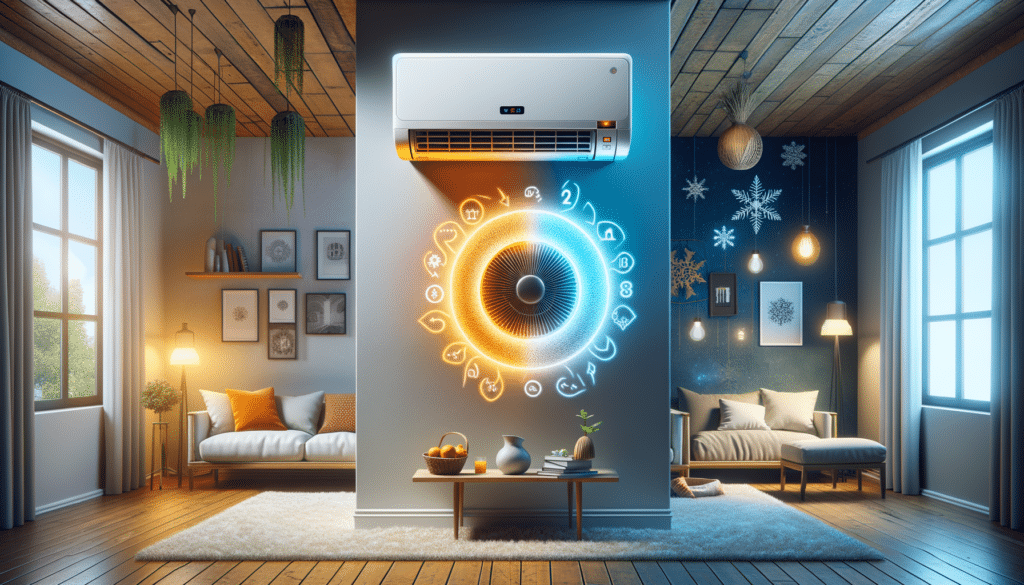Understanding Heat Pumps: An Overview
Heat pumps are an innovative solution for regulating indoor temperatures, providing both heating and cooling functions within a single system. Unlike traditional systems that generate heat, heat pumps work by transferring heat from one place to another. This process is not only energy-efficient but also environmentally friendly, as it reduces the need for fossil fuels.
Heat pumps operate on a simple principle: they extract heat from the outside air, ground, or water, and move it indoors. During warmer months, the process reverses, allowing the system to cool the interior by transferring heat outside. This dual functionality makes heat pumps a versatile choice for year-round climate control.
Key benefits of heat pumps include:
- Energy efficiency: By moving heat rather than generating it, heat pumps can significantly reduce energy consumption.
- Cost savings: Lower energy use translates to reduced utility bills.
- Environmental impact: Decreased reliance on fossil fuels helps reduce carbon emissions.
As more homeowners seek sustainable and cost-effective solutions for climate control, heat pumps are becoming increasingly popular as a viable alternative to conventional heating and cooling systems.
Exploring Ductless Heat Pumps
Ductless heat pumps, also known as mini-split systems, offer a flexible and efficient alternative to traditional ducted systems. These systems consist of an outdoor compressor unit and one or more indoor air-handling units, connected by refrigerant lines. The absence of ducts not only simplifies installation but also enhances energy efficiency by eliminating duct-related heat losses.
One of the main advantages of ductless heat pumps is their ability to provide zone-specific temperature control. Homeowners can install multiple indoor units in different rooms, allowing for customized comfort settings. This feature is particularly beneficial in homes with varying heating and cooling needs across different areas.
Additional advantages of ductless heat pumps include:
- Ease of installation: With no ductwork required, installation is less invasive and can be completed more quickly.
- Improved air quality: Ductless systems often include advanced filtration features, which help to improve indoor air quality by reducing allergens and pollutants.
- Quiet operation: These systems are designed to operate quietly, enhancing indoor comfort without disruptive noise.
Ductless heat pumps are an excellent option for homes without existing ductwork or for room additions where extending ductwork is impractical.
When to Consider Heat Pump Replacement
Like any mechanical system, heat pumps have a finite lifespan and will eventually require replacement. Recognizing the signs that a heat pump is nearing the end of its life can help homeowners plan for a timely replacement, ensuring continued comfort and efficiency.
Common indicators that it may be time to replace a heat pump include:
- Age: Most heat pumps have a lifespan of about 10-15 years. If your system is within this age range, it may be time to consider a replacement.
- Frequent repairs: If your heat pump requires frequent repairs or has experienced significant breakdowns, investing in a new system may be more cost-effective in the long run.
- Decreased efficiency: A noticeable increase in energy bills or a decline in heating and cooling performance can signal that a heat pump is no longer operating efficiently.
- Unusual noises: Unexplained noises such as rattling or grinding can indicate mechanical issues that may necessitate replacement.
Replacing an aging or inefficient heat pump with a newer model can provide improved energy efficiency, enhanced comfort, and lower operating costs. Consulting with a professional HVAC technician can help determine the best replacement options for your home.
Choosing the Right Heat Pump for Your Home
Selecting the appropriate heat pump for your home involves considering several factors, including climate, home size, and specific heating and cooling needs. Understanding these elements can help ensure that you choose a system that provides optimal performance and efficiency.
Key considerations when selecting a heat pump include:
- Climate: In milder climates, air-source heat pumps are often sufficient. However, in areas with extreme temperatures, ground-source (geothermal) heat pumps may offer better performance.
- Home size: The size of your home and the number of rooms will influence the type and capacity of the heat pump needed. An HVAC professional can perform a load calculation to determine the appropriate size for your home.
- Energy efficiency: Look for heat pumps with high Seasonal Energy Efficiency Ratio (SEER) ratings and Heating Seasonal Performance Factor (HSPF) ratings, as these indicate better energy efficiency.
- Budget: While initial costs can vary, investing in a high-efficiency model can lead to long-term savings on energy bills.
By carefully evaluating these factors, homeowners can choose a heat pump that meets their needs and provides reliable, year-round comfort.
The Future of Heat Pumps: Trends and Innovations
As technology advances and environmental concerns grow, the heat pump industry is evolving with new trends and innovations aimed at enhancing efficiency and sustainability. Understanding these developments can help homeowners make informed decisions about future upgrades or installations.
Emerging trends in heat pump technology include:
- Smart technology integration: Many modern heat pumps now incorporate smart thermostats and connectivity features, allowing for remote monitoring and control via smartphones.
- Hybrid systems: Combining heat pumps with other heating technologies, such as solar panels or traditional furnaces, can optimize energy use and increase overall efficiency.
- Improved cold climate performance: Advances in heat pump technology are enhancing performance in colder climates, making them a viable option even in regions with harsh winters.
- Refrigerant innovations: The industry is moving toward environmentally friendly refrigerants with lower global warming potential (GWP), reducing the environmental impact of heat pump systems.
These innovations are paving the way for more efficient and sustainable heating and cooling solutions, positioning heat pumps as a key component in the future of home climate control.


